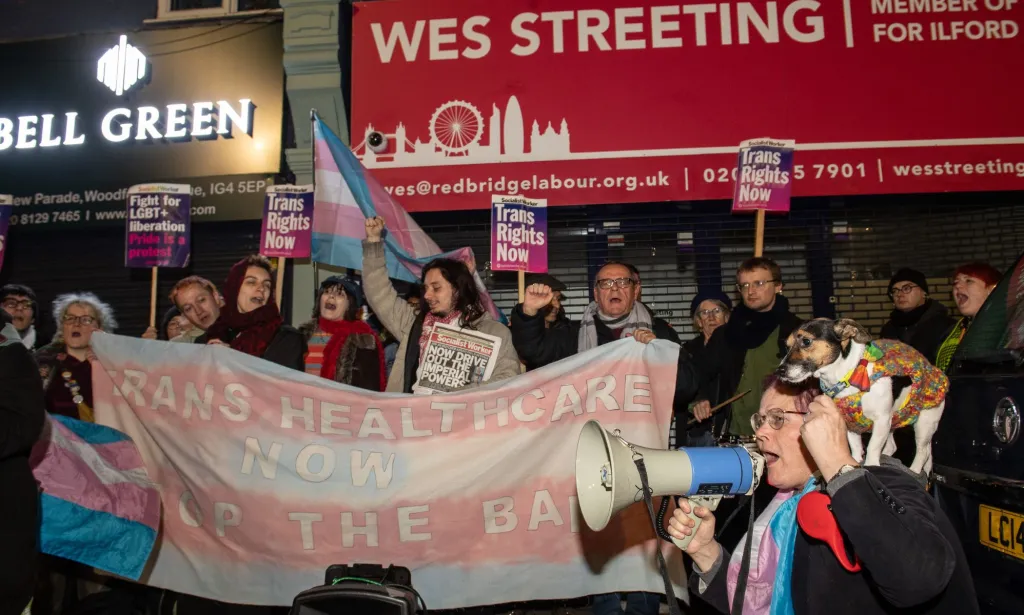
Big Brother housemate Sam has spoken about their gender identity. (ITV)
Big Brother contestant Sam has opened up about their gender identity during a powerful conversation with a fellow housemate, in which they shut down misinformation about healthcare for transgender youth.
Zumba instructor Sam, 27, who also goes by their musician name Smashby, spoke to 23-year-old parish councillor and fellow Big Brother housemate George in last night’s episode (1 October).
The conversation started with Sam explaining drag shows, with George asking why Sam doesn’t do drag himself.
“I just love being a personality as myself, I think it’s enough and I blend gender enough to be entertaining enough and eye-catching enough so it works,” he said.
Asked by George what his gender is, Sam explained: “Just what anybody wants. I just basically live life as me. And if anyone wants to call me something they can, I’m not bothered really. It’s more like everyone else, make them feel comfortable and I just live as myself, really.”
On Instagram, Sam lists their pronouns as he/him, they/them and she/her.
George pressed the musician on whether they had “always been like that” in regards to their gender expression.
“[I’ve been] more vocal about it in the past few years, more visually like that the past few years. I’ve always seen myself as that since I was a kid but I didn’t know what that meant and how to articulate that until I got the vocabulary and got in the community and stuff,” they shared.
Then, the conversation took a slightly more contentious turn, with George asking whether “ambiguous genders” had “always existed”.
“Yeah I think so, but maybe just didn’t have labels or the terminology and stuff,” Sam reasoned.
Yet George pushed further, stating that while he believed there are instances of people who “feel like they’ve been born in the wrong body”, there is currently a gender “ideology” being forced upon “vulnerable minds, like children”, which leads them to question whether they are trans.
“I don’t know if that’s healthy for kids in development,” he argued. “I’ve just heard cases where kids get the op done and everything, and that’s irreversible and then they change their mind and realise they were just gay.”
Sam gracefully shut George’s stance down, explaining that no children in the UK undergo gender-affirming surgeries until they are adults, aged 18 and above.
“A lot of kids can’t have the op [gender-affirming surgery] and stuff ‘cos it’s illegal,” they said.
“The only thing you can do, or could do before last year, underage [under 18] was get put on hormones, but that took about two years at least to go through mental evaluations.
“You have to go to doctors and prove that you’re trans and everything first, and then you get on hormones, which are reversible. That was always accessible to kids before last year, and now that’s not a thing now.”
In December 2024, the UK’s health secretary Wes Streeting announced an “indefinite ban” on puberty blockers for trans youth under the age of 18. The ban has led to “overwhelming levels of distress” among trans youth in the country, according to research published in the Journal of Gender Studies in June.
 Wes Streeting has faced considerable backlash for his decision to ban puberty blockers indefinitely. (Getty)
Wes Streeting has faced considerable backlash for his decision to ban puberty blockers indefinitely. (Getty)
Sam continued: “So it’s more just giving them the option to have a pause in their puberty and think what they want for themselves. But nothing life changing happens until you are an adult and you have to take years to prove it and stuff, so it’s probably more misinformation and propaganda.”
Research published in the medical journal Jama Pediatrics in March 2024 also rebukes George’s argument that trans youth “change their mind and realise they were just gay.”
The research found that just one per cent of trans teenagers detransition post medical intervention, such as taking puberty blockers or hormone replacement therapy. Similarly, a study published in October last year uncovered that 97 per cent of US and Canadian under-18s accessing such medical care were “highly satisfied” with the results.
In May 2024, a study published in the American Journal of Surgery found that less than 0.5 per cent of people who had accessed hormone replacement therapy (HRT) as part of their gender-affirming healthcare experienced some form of regret.
Plus, as detailed in a 2023 study, some of the small number of people who regretted accessing gender-affirming care came to understand that their gender identity was not binary, and they identified as non-binary instead, while some others simply wished for more time to explore their gender identity.
Big Brother continues on ITV2 and ITVX, Sunday through to Friday, at 9pm BST.
Share your thoughts! Let us know in the comments below, and remember to keep the conversation respectful.

